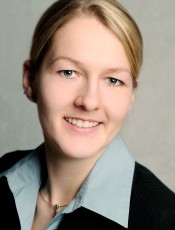|
Scientist
>
Ass. Prof. Dr. Annette Andrieu-Brunsen
Ass. Prof. Dr. Annette Andrieu-Brunsen
// studied chemistry in Marburg and completed her doctoral studies from 2007 to 2010 at the Max Planck Institute for Polymer Research in Mainz Using functional polymers in porous structures for transport controlSwitchable nanochannels - von Ass. Prof. Dr. Annette Andrieu-Brunsen
Can molecular transport be controlled by nanoscale pores? In both human technology and Nature, many transport and separation processes are based on pores and porous materials. If transport needs to be time-controlled and separation based not merely on size, it becomes necessary to combine pores of a certain size with switchable chemical functions or polymers.
 |
|





